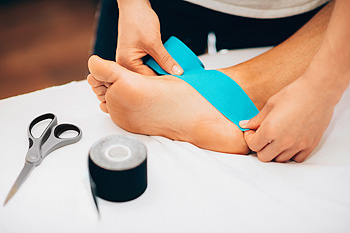 The feet are susceptible to cuts that may penetrate the skin. Minor wounds can be treated with bandages or skin glue, and the healing process will accelerate if the cuts are kept covered and dry. If you have stepped on glass or rocks, an X-ray may be necessary to ensure there is no debris left in the foot. For serious wounds, it is beneficial to keep weight off of the foot as much as possible, as this can help in giving the foot a chance to heal. If the wound is bleeding, it is helpful to apply direct pressure. If this fails to work, it is wise to seek medical attention. Additionally, an infection may be present which is often accompanied by a fever. For wounds on the feet, it is suggested to seek the counsel of a podiatrist who can guide you towards proper treatment.
The feet are susceptible to cuts that may penetrate the skin. Minor wounds can be treated with bandages or skin glue, and the healing process will accelerate if the cuts are kept covered and dry. If you have stepped on glass or rocks, an X-ray may be necessary to ensure there is no debris left in the foot. For serious wounds, it is beneficial to keep weight off of the foot as much as possible, as this can help in giving the foot a chance to heal. If the wound is bleeding, it is helpful to apply direct pressure. If this fails to work, it is wise to seek medical attention. Additionally, an infection may be present which is often accompanied by a fever. For wounds on the feet, it is suggested to seek the counsel of a podiatrist who can guide you towards proper treatment.
Wound care is an important part in dealing with diabetes. If you have diabetes and a foot wound or would like more information about wound care for diabetics, consult with Jim Maxka, DPM from South Penn Foot & Ankle Associates. Our doctor will assess your condition and provide you with quality foot and ankle treatment.
What Is Wound Care?
Wound care is the practice of taking proper care of a wound. This can range from the smallest to the largest of wounds. While everyone can benefit from proper wound care, it is much more important for diabetics. Diabetics often suffer from poor blood circulation which causes wounds to heal much slower than they would in a non-diabetic.
What Is the Importance of Wound Care?
While it may not seem apparent with small ulcers on the foot, for diabetics, any size ulcer can become infected. Diabetics often also suffer from neuropathy, or nerve loss. This means they might not even feel when they have an ulcer on their foot. If the wound becomes severely infected, amputation may be necessary. Therefore, it is of the upmost importance to properly care for any and all foot wounds.
How to Care for Wounds
The best way to care for foot wounds is to prevent them. For diabetics, this means daily inspections of the feet for any signs of abnormalities or ulcers. It is also recommended to see a podiatrist several times a year for a foot inspection. If you do have an ulcer, run the wound under water to clear dirt from the wound; then apply antibiotic ointment to the wound and cover with a bandage. Bandages should be changed daily and keeping pressure off the wound is smart. It is advised to see a podiatrist, who can keep an eye on it.
If you have any questions, please feel free to contact our office located in Hanover, PA . We offer the newest diagnostic and treatment technologies for all your foot care needs.
